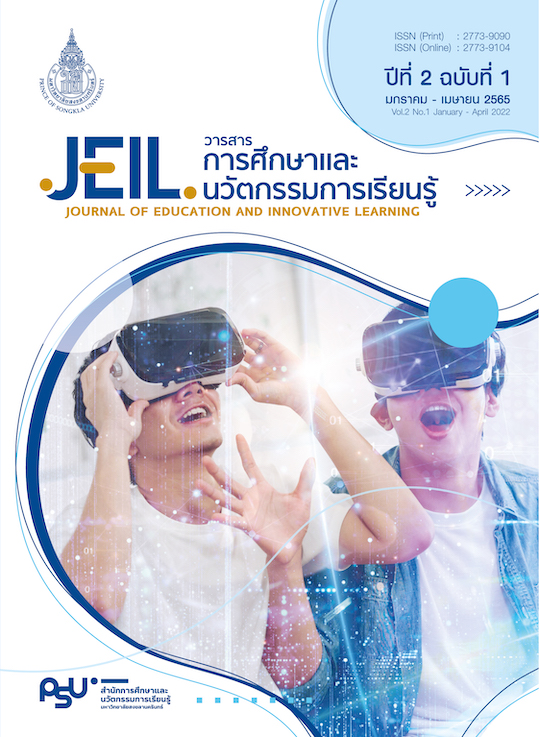การพัฒนาสมรรถนะของนักศึกษาผ่านการจัดการเรียนรู้โดยใช้โครงงานเป็นฐาน กรณีศึกษา รายวิชาการตลาดดิจิทัลและ การจัดการ คณะพาณิชยศาสตร์และการจัดการ มหาวิทยาลัยสงขลานครินทร์ วิทยาเขตตรัง
Main Article Content
บทคัดย่อ
การวิจัยนี้มีวัตถุประสงค์เพื่อ 1) พัฒนากระบวนการจัดการเรียนรู้โดยใช้โครงงานเป็นฐาน 2) ศึกษาผลการจัดการเรียนรู้โดยใช้โครงงานเป็นฐานต่อการพัฒนาสมรรถนะของนักศึกษา และ 3) เพื่อศึกษาความพึงพอใจของนักศึกษาที่มีต่อการจัดการเรียนรู้โดยใช้โครงงานเป็นฐาน ประชากรของการวิจัย คือ นักศึกษาระดับปริญญาตรี หลักสูตรการจัดการสารสนเทศและคอมพิวเตอร์ ชั้นปีที่ 4 จำนวน 87 คน เครื่องมือวิจัย ได้แก่ แบบประเมินเพื่อทวนสอบผลการเรียนรู้ของนักศึกษา และแบบประเมินความพึงพอใจของนักศึกษา สถิติที่ใช้ในการวิเคราะห์ข้อมูล ได้แก่ ค่าเฉลี่ย และค่าเบี่ยงเบนมาตรฐาน ผลการวิจัย พบว่า 1) กระบวนการจัดการเรียนรู้โดยใช้โครงงานเป็นฐาน ประกอบด้วย การเก็บรวบรวมความต้องการทางการตลาดดิจิทัลจากผู้ประกอบการ การวางแผนและการดำเนินงานทางการตลาดดิจิทัล การนำเสนอความก้าวหน้าและผลการดำเนินโครงการ และการแลกเปลี่ยนความคิดเห็นร่วมกันในชั้นเรียน 2) ผลการประเมินเพื่อทวนสอบผลการเรียนรู้ของนักศึกษา โดยรวมอยู่ในระดับมากที่สุด โดยการจัดการเรียนรู้โดยใช้โครงงานเป็นฐานช่วยพัฒนาทักษะด้านการตลาดดิจิทัล และทักษะการเรียนรู้ด้านความคิดสร้างสรรค์ การคิดเชิงวิพากษ์ การทำงานเป็นทีม และการสื่อสารให้กับนักศึกษา และ 3) นักศึกษาพึงพอใจต่อการจัดการเรียนรู้แบบใช้โครงงานเป็นฐานโดยรวมในระดับมากที่สุด ผลการวิจัยแสดงให้เห็นว่าการจัดการเรียนรู้โดยใช้โครงงานเป็นฐานเป็นวิธีการที่เหมาะสมในการนำมาใช้จัดการเรียนการสอนเพื่อพัฒนาสมรรถนะของนักศึกษา
Article Details

อนุญาตภายใต้เงื่อนไข Creative Commons Attribution-NonCommercial-NoDerivatives 4.0 International License.
เนื้อหาและข้อมูลในบทความที่ตีพิมพ์ในวารสารการศึกษาและนวัตกรรมการเรียนรู้ ถือเป็นข้อคิดเห็นและความรับผิดชอบของผู้เขียน ซึ่งกองบรรณาธิการวารสาร ไม่จำเป็นต้องเห็นด้วยหรือร่วมรับผิดชอบใด ๆ และไม่สงวนสิทธิ์การคัดลอกบทความเพื่อใช้ประโยชน์ทางวิชาการ แต่ให้อ้างอิงข้อมูลแสดงที่มาของบทความทุกครั้งที่นำไปใช้ประโยชน์
เอกสารอ้างอิง
Art-in, S., & Netthanomsak, T. (2011). Project-based learning in curriculum development course for five-year bachelorís degree students. KKU Research Journal, 1(1), 1-16. [in Thai]
Bloom, B. S., Engelhart, M. D., Furst, E. J., Hill, W. H., & Krathwohl, D. R. (1956). Handbook I: cognitive domain. New York: David McKay.
Kongyoo, P., Chaiprasert, P., & Phibranchon, S. (2019). Learning management using project-based learning activities on "Work and Energy" case study, Mathayomwatkhaosukim school. Saeng Isan Journal, 16(2), 50-68. [in Thai]
Kusirirat, K., & Nuchprayoon, N. (2019). The effects of learning activities by project-based learning in sound and video editing course of undergraduate students. Dhonburi Rajabhat University Journal, 13(1), 139-153. [in Thai]
Kwankaew, P., Vanichvasin, P., & Siripipattanakoon, S. (2016). Development of creative characteristics using project-based learning (PjBL) for High Vocational Students of Program in Secretarial. Journal of Southern Technology, 9(1), 1-6. [in Thai]
Lahtam, P. (2020). Project-based learning management with academic achievement in food preservation, learning subject careerand technology for students in Mathayom Secondary 1. Journal of Education, Prince of Songkla University, Pattani Campus, 32(3), 187-199. [in Thai]
Mungphingklang, A., & Doungwilai, D. (2019), Effects of project-based learning management on sentence type of grade 2 secondary school students. Walailak Journal of Learning Innovations, 5(1), 85-100. [in Thai]
Office of the Basic Education Commission. (2021). First step of project-based learning. Bangkok, Thailand: N.A.Rattana Trading. Retrieved from https://www.obec.go.th/archives/510216 [in Thai]
Office of the Education Council. (2007). Guidelines for learning management student-centered learning: Project-based learning management. Retrieved from http://backoffice.onec.go.th/uploads/Book/365-file.pdf [in Thai]
Office of the National Education Commission. (2003). National Education Act, B.E. 2542 (1999) and Amendment (Second National Education Act B.E. 2545 (2002)). Bangkok, Thailand: Pimdeekarnpim. [in Thai]
Panich, V. (2012). Way of learning for students in the 21st century (3rd ed.). Bangkok, Thailand: Tathata Publications. [in Thai]
Plitakul, P. (2017). Learning management based on project-based learning for music teaching experiences of current students at the Faculty of Music, Silpakorn University. Veridian E-Journal, Silpakorn University, 10(2), 694-708. [in Thai]
Prakrongjai, P. (2019). Project-based learning in traditional folk media for communication. Journal of Mass Communication, 7(2), 68-84. [in Thai]
Prakrongjai, P. (2020). Project based learning. Silpakorn University Journal, 40(1), 155-163. [in Thai]
Promkutkeaw, T. (2014, May-June). Introduction to project-based learning management. IPST Magazine, 42(188). Retrieved from https://emagazine.ipst.ac.th/188/IPST188/assets/common/downloads/IPST188.pdf [in Thai]
Pukiat, L. (2009). Project-based teaching and research-based teaching: tasks that teachers in the elementary school can do. Bangkok, Thailand: Saha & Sons Printing. [in Thai]
Rittibul, P., & Inthachote, S. (2020). The results of project-based learning in training techniques of music and drama of thai classical dance educationís undergraduate students rajamangala university of technology thanyaburi. Journal of Fine Arts Research and Applied Arts, 7(1), 89-106. [in Thai]
Yoelao, D., et al. (2014) The study of PBL-based learning management from the Knowledge Building Project to enhance the skills of the 21st century of children and youth: based on the success experiences of Thai schools. Bangkok: Limited Partnership Thippawisut. [in Thai]


